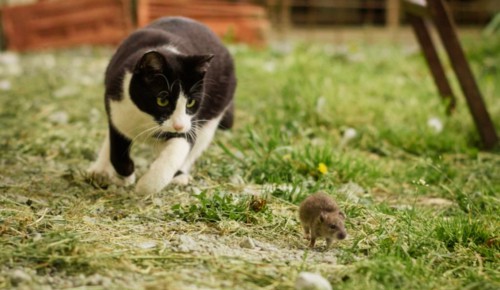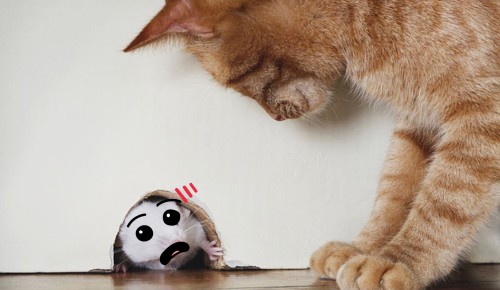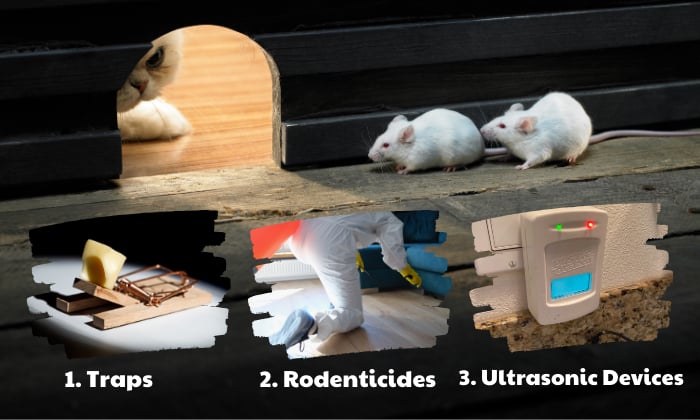Do cats keep rats away? Absolutely. Cats, with their natural hunting talents and acute senses, are effective rat deterrents. The topic of feline pest management and the science underlying its effectiveness will be covered below.
Whether you’re a cat owner seeking solutions to a rat problem or curious about the interaction between these animals, we share insights and suggestions to help you harness the natural pest-controlling talents of your feline companions.
Table of Contents
Cats Deterring Rats
Because of their evolutionary background, natural predatory impulses, and extraordinary senses, cats have a unique capacity to deter rats.
1. How cats deter rats
First of all, cats are descended from lone hunters known as Felis silvestris. They acquired outstanding predatory abilities during millions of years of evolution, such as stalking, pouncing, and prey capture. Domesticated cats still possess these abilities, which makes them very efficient rat deterrents.
- According to studies, cats behave when hunting in a way comparable to that of their wild predecessors, using stealth and agility to catch mice.
Research indicate that cats frequently exhibit a distinctive hunting behavior when pursuing rodents, highlighting their capacity to repel rats.
- Second, cats have exceptional sensory faculties. They can spot rodents long before they become a visible annoyance thanks to their great sense of smell and sensitive hearing.
Cats can successfully discover and stalk their prey. showing that they can sense the presence of rodents through scent markers and minor aural clues.
Cats’ night vision allows them to pursue rats at night, when the rodents are most active, making rats afraid of cats, according to research.
2. Smell of cat
How cats attack rats?
Rats can detect cats’ presence thanks to their pheromone emissions. That’s how cats scare away rats naturally.
Rats exposed to the smell of cats showed elevated stress levels and decreased activity, indicating a heightened state of worry and fear in the presence of these feline predators.
How Do Cats Deter Rats Naturally?
Through their intrinsic predatory instincts and perceptive talents, feral cats naturally deter rodents.
Cats are proficient rat hunters because they frequently engage in stalking and pouncing actions when faced with rats.
Do cats kill rats? Some can, while some can’t. Cats have amazing senses of smell and hearing, among other sensory abilities.
Even before rodents become visible, they may identify their existence by scent markers thanks to their keen sense of smell.
Cats have an advantage over rats in that they can pick up on their tiny sounds, such as scurrying or chewing. Additionally, cats chase rats because of their night vision.
Rats can be deterred by the mere presence of cats, thus you can be assured that from your house.
Pros and Cons of Using Cats for Rat Control
When considering whether to rely on feline pest management techniques, weighing the advantages and disadvantages of using cats vs rats is important.
- Natural Predators: Cats have solid predatory instincts and are natural hunters. They can aid in rat population management without using environmentally hazardous pesticides or traps.
- Low Maintenance: Once taught, cats get rid of rats at bay. They can continue hunting without much human assistance because they are largely self-sufficient.
- Psychological Deterrent: Rats can be repelled just by the presence of cats. Rats may stay away from regions where cats reside as a result of the perceived threat.
- Varied Effectiveness: Not all cats are adept hunters, and some might not be at all interested in going after rats.
- Health and Safety Concerns: Cats that hunt rats run the risk of contracting illnesses from rodents. Cats may also suffer harm if they clash with larger rodents or other animals.
- Environmental Impact: Cats occasionally threaten the populations of other animals, such as birds and rats. Local ecologies may be harmed by this.
Other Options for Rodent Control
There are several efficient alternatives to using cats to manage rodents, each with its benefits and factors to take into account:
- Traps: Humane and precise ways to catch rodents include traditional snap, electronic, and live traps. They make it simple to get rid of caught rodents.
- Rodenticides: Chemical baits can be useful, but care must be taken because they can endanger unintended animals and harm the ecosystem.
- Ultrasonic Devices: Ultrasonic repellers send out high-frequency noises to scare away rats. Although they are safe for people and animals, they might be ineffective because rats can get used to the noise.
Conclusion
The age-old question: “Do cats keep rats away?”, is answered by their innate predatory instincts and sensory talents. Scientific evidence supports the idea that cats as deterrents are effective against rats, with their evolutionary history and psychological influence playing critical roles.
Furthermore, utilizing cats as the sole rat control technique may not be foolproof, and other options should be considered based on the unique scenario.

I am Amy Sawy, a Doctor of Veterinary Medicine (DVM) graduate from the University of Kansas. y husband, Dr. Plummer, and I own a veterinary clinic in Phillipsburg, Kansas. In addition to my professional background, I am a devoted pet owner myself, with a household that includes dogs, rodents, and most notably, cats – a total of five felines in my home.
In 2020, I joined an organization as a professional writer, leveraging my experience and collaborating with my team to deliver the most valuable information for your cat’s care.
















